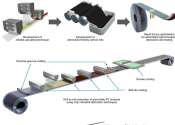Responsible AI: Three tools to help businesses
Artificial Intelligence (AI) is one of the most powerful tools developed in recent decades. And, as the saying goes, with great power comes great responsibility.
Mar 28, 2024
0
1
CSIRO, Commonwealth Scientific and Industrial Research Organization is Australia's governmental agency for scientific research. CSIRO was originally founded in 1926 as the Advisory Council of Science and Industry. CSIRO employs 6,000 scientists, technicians and support staff with 50 sites around Australia and labs in Mexico and France. CSIRO is divided into 16 operational divisions including but not limited to, Australia Telescope National Laboratory, Energy Technology, Entomology, Material Sciences and Engineering, Sustainable Ecosystems and Molecular and Health Technologies. CSIRO is noted for its work at the Darwin Laboratories, the invention of the Atomic Absorption Spectroscopy, invention of the insect repellent Aerogar and a series of biological control inhibiting the spread of rabbit hemorrhagic disease. Media inquiries are welcome.
Business

Artificial Intelligence (AI) is one of the most powerful tools developed in recent decades. And, as the saying goes, with great power comes great responsibility.
Mar 28, 2024
0
1
Business

Foundation models, the technology underpinning the rise of generative artificial intelligence (AI), could boost Australia's productivity, bolster our economy, and transform industries according to a new report by CSIRO, Australia's ...
Mar 28, 2024
0
1
Robotics

Bushfires can move at astonishing speeds. The land, amount of vegetation, and the weather all have a big impact on how a fire spreads. Staying one step ahead is no easy task, but our bushfire researchers are working on it.
Mar 25, 2024
0
6
Energy & Green Tech

Scientists from Australia's national science agency, CSIRO, have led an international team to a clean energy breakthrough by setting a new efficiency record for fully roll-to-roll printed solar cells.
Mar 12, 2024
1
109
Energy & Green Tech

State-of-the-art printed flexible solar cell technology developed by Australia's national science agency, CSIRO, was successfully launched into space today (March 5) aboard Australia's largest private satellite, Optimus-1, ...
Mar 5, 2024
0
13
Security

In a world where you can create a virtual clone of a person in a matter of minutes, how do we know what's real? It may sound like dystopian science fiction, but deepfakes are a reality causing serious social, financial and ...
Feb 10, 2024
0
19
Machine learning & AI

With the widespread adoption of generative AI tools like ChatGPT, we can no longer assume that new ideas and inventions are solely the result of human effort. As an organization driven by innovation and invention, Intellectual ...
Dec 20, 2023
0
5
Energy & Green Tech

A roadmap to significantly reduce plastic waste in India has been released today, with CSIRO collaborating with The Energy and Resources Institute (TERI), the Council of Scientific and Industrial Research-National Environmental ...
Dec 7, 2023
0
1
Energy & Green Tech

It's tough for the cement and lime business to make its important products without generating high emissions. So, the industry is investing in research and innovative pathways to reduce its hard-to-abate emissions.
Nov 30, 2023
0
1
Machine learning & AI

Artificial intelligence (AI) is so hot right now. ChatGPT, DALL-E, and other AI-driven platforms are providing us with completely new ways of working. Generative AI is writing everything from cover letters to campaign strategies ...
Nov 24, 2023
0
3